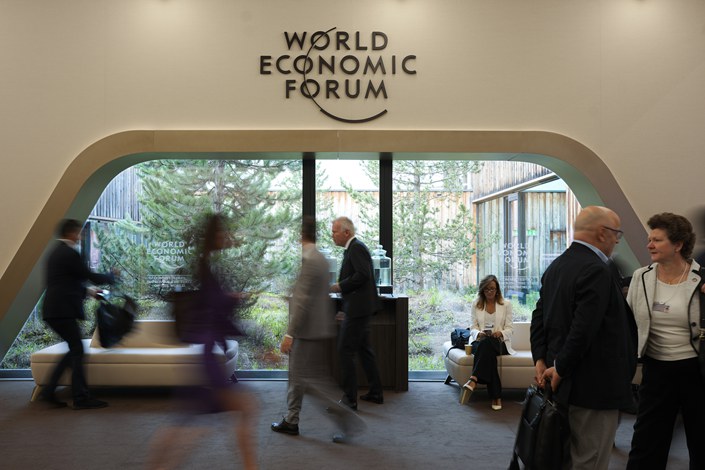
Davos, the Alpine resort, thronged by the gilded crowds of the World Economic Forum (WEF) is a bacchanal that now seems antiquated, if not obsolete.
Still, watching the crowds from the sidelines, I can’t help but feel that the 2022 edition — with its lavish dinners, corporate pavilions and chalets — is a sort of fin de siècle, an end of an era, that was set in motion by Covid-19 and other events.
The Swiss retreat was first made famous by Nobel Prize winner Thomas Mann, whose 1924 novel “The Magic Mountain” depicted imperial Europe in all its decadent glory just before the cataclysm of WWI.
Now, again from Davos, one can see the portents of an end of an age as the neoliberal globalization that has characterized the past four decades teeters on the brink of collapse.
The WEF, whose annual flagship conference Davos has hosted since 1971 (except in 2002 when it was moved to New York in solidarity after 9/11), was once a haven for the elite, to debate and set the global agenda. It’s like the sanatorium in “The Magic Mountain” that the protagonist Castrop encounters, filled with Europeans from a host of backgrounds and traditions.
But after 40 years under the economic policies launched by Reagan and Thatcher, the sense that growth and stability would bring democracy, peace and prosperity is now looking wrong-headed and naive. We are entering a world of menace and distrust.
The Russians (and especially the oligarchs) are, unsurprisingly, absent. The “Russia House” building in Davos is now occupied by Ukrainians and renamed the “Russian War Crimes House.”
More tellingly, there are only a handful of Chinese present. Covid-19 restrictions have been draconian but more chilling still, is the depiction of China as an enemy that needs to be isolated.
Southeast Asians (except for an exuberant Indonesian contingent) were similarly subdued. Separately, the composition and focus of the Gulf and Indian delegations (business, business and more business) meant that the underlying geopolitical differences have been downplayed, if not ignored.
Assuming the royal “WE,” the Americans and Europeans have prevailed with Ukraine dominating all discussions. In the absence of countervailing voices, the conclusions are chilling and draconian.
“WE” have decided that globalization must be reshaped as “WE” see fit as four decades of economic policymaking, free trade and the entire WTO super-structure (since 1995) is discarded. In its place comes “resilience,” “friend-shoring” and “values driven trade.”
That Americans should strike a bellicose tone is not surprising. More startling is Ursula von der Leyen’s transformation from peaceable German bureaucrat to Valkyrie, striding on stage to rally the troops with promises of glory. The post-Second World War promise of European peace has faded and the historical default of Europe warring with itself is back.
Yet, as the paper-thin Indo-Pacific Economic Framework reveals, the West’s outreach to the Rest is half-hearted at best.
All sane people want the invasion of Ukraine ended, with its independence, territorial integrity, and democracy intact.
But global forums like the WEF are increasingly providing less and less leadership or solutions to the pressing problems facing the wider global south. The technocrats and plutocrats tucking into aperol spritzes and Alpine desserts on the Promenade don’t know what it is like to be at the sharp end.
And this is the problem with this year’s Davos. With their rivals excluded, Americans and Europeans are once again conflating the West with the Rest.
How can it be a “World” Economic Forum when the concerns of Asia, which will contribute 60% of global growth by 2030, are disregarded?
The West in fact may be preparing to decouple.
US Commerce Secretary Gina Raimondo has recently urged Congress to incentivize American semiconductor manufacturing, warning that its reliance on Taiwan (whose future remains a massive question mark), which supplies as much as 70% of its sophisticated computer chips, was untenable. Instead, America must make its own.
Whether a liberal White House will truly embrace isolationism is debatable. But what ought to be clear is that even America may not be a reliable customer or trade partner for Asia, as regional, rather than global supply chains become the norm thanks to industrial polices in Europe and the US aimed at securing control of vital technologies.
The needs for Southeast Asia to “speak out” and “look out for its own interests” are more urgent than before. But how to unite this increasingly divergent region?
From Davos, it’s clear to see that winter is coming again. But as so ominously foreshadowed in “The Magic Mountain,” it will bring the world something far different from togetherness and beauty.
Karim Raslan is Founding Chief Executive Officer of KRA Group, a South-East Asian public affairs consulting firm.
The views and opinions expressed in this opinion section are those of the authors and do not necessarily reflect the editorial positions of Caixin Media.
If you would like to write an opinion for Caixin Global, please send your ideas or finished opinions to our email: opinionen@caixin.com
Get our weekly free Must-Read newsletter.







